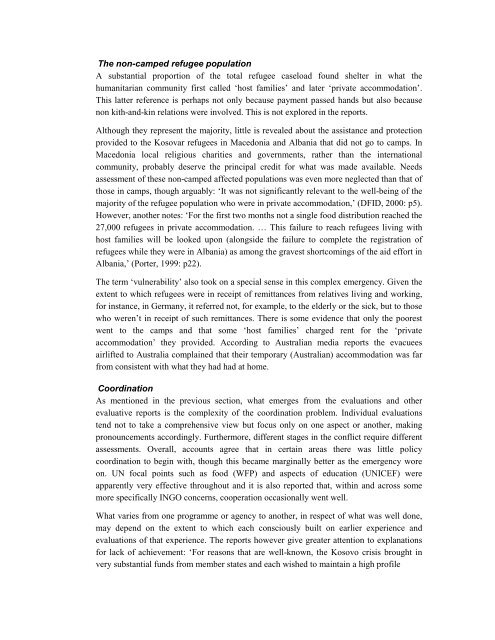Download PDF - ReliefWeb
Download PDF - ReliefWeb
Download PDF - ReliefWeb
You also want an ePaper? Increase the reach of your titles
YUMPU automatically turns print PDFs into web optimized ePapers that Google loves.
The non-camped refugee population<br />
A substantial proportion of the total refugee caseload found shelter in what the<br />
humanitarian community first called ‘host families’ and later ‘private accommodation’.<br />
This latter reference is perhaps not only because payment passed hands but also because<br />
non kith-and-kin relations were involved. This is not explored in the reports.<br />
Although they represent the majority, little is revealed about the assistance and protection<br />
provided to the Kosovar refugees in Macedonia and Albania that did not go to camps. In<br />
Macedonia local religious charities and governments, rather than the international<br />
community, probably deserve the principal credit for what was made available. Needs<br />
assessment of these non-camped affected populations was even more neglected than that of<br />
those in camps, though arguably: ‘It was not significantly relevant to the well-being of the<br />
majority of the refugee population who were in private accommodation,’ (DFID, 2000: p5).<br />
However, another notes: ‘For the first two months not a single food distribution reached the<br />
27,000 refugees in private accommodation. … This failure to reach refugees living with<br />
host families will be looked upon (alongside the failure to complete the registration of<br />
refugees while they were in Albania) as among the gravest shortcomings of the aid effort in<br />
Albania,’ (Porter, 1999: p22).<br />
The term ‘vulnerability’ also took on a special sense in this complex emergency. Given the<br />
extent to which refugees were in receipt of remittances from relatives living and working,<br />
for instance, in Germany, it referred not, for example, to the elderly or the sick, but to those<br />
who weren’t in receipt of such remittances. There is some evidence that only the poorest<br />
went to the camps and that some ‘host families’ charged rent for the ‘private<br />
accommodation’ they provided. According to Australian media reports the evacuees<br />
airlifted to Australia complained that their temporary (Australian) accommodation was far<br />
from consistent with what they had had at home.<br />
Coordination<br />
As mentioned in the previous section, what emerges from the evaluations and other<br />
evaluative reports is the complexity of the coordination problem. Individual evaluations<br />
tend not to take a comprehensive view but focus only on one aspect or another, making<br />
pronouncements accordingly. Furthermore, different stages in the conflict require different<br />
assessments. Overall, accounts agree that in certain areas there was little policy<br />
coordination to begin with, though this became marginally better as the emergency wore<br />
on. UN focal points such as food (WFP) and aspects of education (UNICEF) were<br />
apparently very effective throughout and it is also reported that, within and across some<br />
more specifically INGO concerns, cooperation occasionally went well.<br />
What varies from one programme or agency to another, in respect of what was well done,<br />
may depend on the extent to which each consciously built on earlier experience and<br />
evaluations of that experience. The reports however give greater attention to explanations<br />
for lack of achievement: ‘For reasons that are well-known, the Kosovo crisis brought in<br />
very substantial funds from member states and each wished to maintain a high profile
















![CynefinFramework final [Read-Only]](https://img.yumpu.com/19017304/1/190x135/cynefinframework-final-read-only.jpg?quality=85)